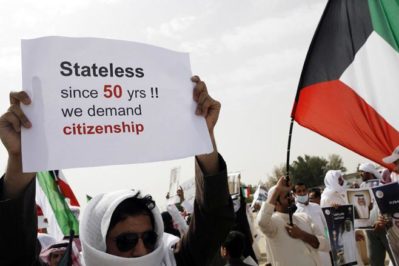In recent months, the Kuwaiti government has amped up its targeting and harassment of its bidoon population – a stateless Arab minority. Kuwait is home to over 100,000 bidoon who face hurdles accessing government documentation, employment opportunities, healthcare, and education. In 1986, the Kuwaiti government branded the bidoon population as “illegal residents,” despite most being descendants of nomadic Arab tribes residing in Kuwait around the timethe country gained independence in 1961. Lack of citizenship leaves bidoon vulnerable to human rights abuses in Kuwait, and at the same time, does not allow them to gain access to documentation required to leave the country. Men, women, and children in the bidoon community cannot obtain driver’s licenses, marriage licenses, birth certificates, or other important government documents, which inhibits their ability to utilize government services, vote, work, or get an education. Peaceful protests calling for basic human rights have resulted in Kuwaiti authorities repeatedly arresting and harassing bidoon activists.
On 12 July 2019, at a sit-in at Freedom Square in Kuwait City, demonstrators protested the lack of bidoon rights following the suicide of 20-year-old Ayed Hamad Moudath, whose inability to obtain documents permitting him to study, work, and use public services resulted in the loss of his job. Prior to the sit in, individuals in vehicles belonging to the General Department of Criminal Investigation and the State Security Bureau harassed the homes of organizers of past sit-ins, who advocated for bidoon rights. At this time, officials arrested human rights defender Abdulhakim Al-Fadhlifrom his home and beat him until he was transported to the Taima police station. The same night State Security forces arrested the following individuals who had previously participated in sit-ins: Ahmed Al-Onan, Awad Al-Onan, Mutaib Al-Onan, Abdullah Al-Fadhli, Yousef Al-Osmi, Ahmed Al-Anzi, Yousif Al-Bashig, Nawaf Al-Bader, and Alaa Al-Saadoun. These individuals were later charged with “threatening the state, spreading false news, harming the reputation of friendly countries, and misuse of the telephone.”
According to reports received by the Gulf Centre for Human Rights (GCHR), the activists have been ordered by the Public Prosecutor’s Office to remain in a prison belonging to the State Security Bureau of Kuwait while the investigation is still pending. They report ill-treatment, including lengthy interrogations and exhaustion. Requests to be transferred to the Central Prison, where they might receive better treatment, were rejected.
Less than two weeks after the sit-in, on 23 July 2019, individuals dressed in civilian clothes kidnapped activist Hamoud Al-Rabah and forced him into a suspected security force vehicle. Al-Rabah had recently published statements on his twitter account, which called for the support of civil and human rights of the bidoon community and demanded the release of the recently-detained activists. Al-Rabah has been an active rights defender since 2011 and has taken part in several peaceful protests.
The following day, on 24 July 2019, bidoon Bader Al-Tamimi was arrested from his home and taken to an unknown location. The bidoon community believes that frequent visits of activists to his home prompted his arrest. On the same day, individuals in four civilian cars arrested activist Khalifa Al-Anzi at his workplace. Journalist Reda Al-Fadhli was also targeted. His whereabouts were unknown for two days, until he was seen at the Public Prosecutor’s Office where he appeared to be under investigation on 25 July 2019.
The restrictions on government services and recent judicial harassment of the bidoon community in Kuwait violates international human rights standards. Because the bidoon activists face “illegal status,” the detained activists cannot fully advocate for their citizenship and are vulnerable to unjust legal proceedings and detainment. Kuwait is in breach of international human rights law by preventing the populational to attain nationalities including the Universal Declaration of Human Rights (UDHR) and Article 29 of the Arab Charter on Human Rights (ACHR). Restrictions faced by the bidoon community also violate treaties to which Kuwait has acceded, including the ICCPR and the International Covenant on Economic, Social, and Cultural Rights (ICESCR). Kuwait’s lack of rights for the bidoon population creates a cycle where future generations experience systemic political, economic, and social discrimination. Kuwait cannot continue to neglect its bidoon population, and must release all activists and end the arbitrary detainment of peaceful protestors.
MacKenzie LeMunyan is an Advocacy Intern with ADHRB





